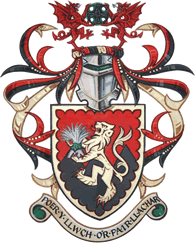



| Ubi materia, ibi geometria. | Lle mae 'na fater, mae 'na geometreg. |
| Wo Materie ist, dort ist Geometrie. | Where there is matter, there is geometry. |
 Poetry in 2006
Poetry in 2006
|
In six millenia I have seen many |
|
A windblown howling. This old orchestra |
|
Pines of Lluest Treharne give sound to time, |
|
The Lord knows that goodly ray,
Dawing traperies repay
Gently she comes to waylay |
The original may be found in Sir Thomas Parry, "Gwaith Dafydd ap Gwilym" (Gwasg Prifysgol Cymru, University ofWales Press). Dafydd ap Gwilym lived from about 1320 to about 1380, and is generally considered to be the great master of the literary form called "cynghanedd". So any attempted translation of such a great poet is bound to fail. However the above tries to translate the syllabic and rhyming pattem, sustained through the whole poem, called a "cywydd". The rules of the cywydd mean that in Welsh there must be consonantal alliteration or some other acceptable form of cynghanedd in every line. The lines must be seven syllable rhyming couplets, accentuated alternating with unaccentuated. I have maintained this rule in nearly all the above rhyming couplets, but not quite all. The rule applied in Welsh usually means one syllable line endings rhyming with multiply syllabic line endings. Also the original first stanza has lines all begining with the letter D, I have not attempted to translate this. There are various other rules which must be adhered to, and this form of poetry was created by Dafydd ap Gwilym himself. He was a younger contemporary of Dante and an older contemporary of Chaucer. The original Welsh is as follows:
|
Duw gwyddiad mae da y gweddai
Harddaws teg a'm anrhegai,
Dolais ferch a'm anerchai, |